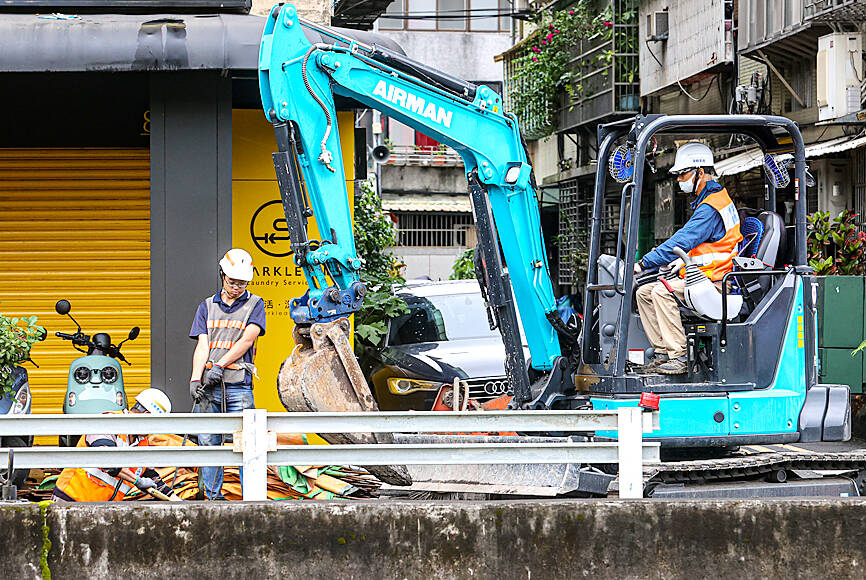The government is to offer an incentive fund of up to NT$13,000 per month to those who accept work in the construction and accommodation industries, the Executive Yuan said yesterday.
The incentive is part of the extended employment program proposed by the Ministry of Labor, and was approved at a weekly Cabinet meeting yesterday morning.
The one-year trial program aims to motivate 20,000 jobseekers to accept jobs in construction, accommodation and other key industries that have reported severe labor shortages, Deputy Minister of Labor Chen Ming-ren (陳明仁) told a news conference after the Cabinet meeting.

Photo: CNA
New hires in the construction and accommodation industries would be paid an additional NT$6,000 per month from the fund, while the amount would be raised to NT$9,000 per month for jobs in rural regions.
New middle-aged and older hires in the construction industry would be paid an incentive of NT$10,000 per month, rising to NT$13,000 per month for those in rural areas.
Those in that age group who work part-time would receive NT$5,000 per month, or NT$6,500 in rural regions.
The salary top-ups in the incentive program are to be provided for 12 months, the ministry said.
“Government agencies overseeing the construction and accommodation industries can subsize employers who hire workers, improve working environments and introduce automated services,” the ministry said.
Employers in the construction and accommodation industries who train new workers after they are hired are to receive a monthly training subsidy of NT$12,000 per employee and NT$15,000 for jobs in remote regions.
The training subsidy is to be available for three months, while workers who complete training are to be offered an additional one-time grant ranging from NT$5,000 to NT$8,000, depending on the work location.
“Workers can benefit not just from the salary subsidies, but also from the improved working conditions that are expected from the incentives,” Chen said.
Several measures to address worker shortages in the construction industry were initiated earlier this year by the Ministry of Labor, the Public Construction Commission and the Ministry of the Interior.
The introduction of precast modular construction methods and enhanced professional skills training were part of that program, Chen said.
Those measures and the incentive program are separate, he added.

SILICON VALLEY HUB: The office would showcase Taiwan’s strengths in semiconductors and artificial intelligence, and help Taiwanese start-ups connect with global opportunities Taiwan has established an office in Palo Alto, one of the principal cities of Silicon Valley in California, aimed at helping Taiwanese technology start-ups gain global visibility, the National Development Council said yesterday. The “Startup Island Taiwan Silicon Valley hub” at No. 299 California Avenue is focused on “supporting start-ups and innovators by providing professional consulting, co-working spaces, and community platforms,” the council said in a post on its Web site. The office is the second overseas start-up hub established by the council, after a similar site was set up in Tokyo in September last year. Representatives from Taiwanese start-ups, local businesses and

‘DETERRENT’: US national security adviser-designate Mike Waltz said that he wants to speed up deliveries of weapons purchased by Taiwan to deter threats from China US president-elect Donald Trump’s nominee for US secretary of defense, Pete Hegseth, affirmed his commitment to peace in the Taiwan Strait during his confirmation hearing in Washington on Tuesday. Hegseth called China “the most comprehensive and serious challenge to US national security” and said that he would aim to limit Beijing’s expansion in the Indo-Pacific region, Voice of America reported. He would also adhere to long-standing policies to prevent miscalculations, Hegseth added. The US Senate Armed Services Committee hearing was the first for a nominee of Trump’s incoming Cabinet, and questions mostly focused on whether he was fit for the

EXPRESSING GRATITUDE: Without its Taiwanese partners which are ‘working around the clock,’ Nvidia could not meet AI demand, CEO Jensen Huang said Taiwan Semiconductor Manufacturing Co (TSMC, 台積電) and US-based artificial intelligence (AI) chip designer Nvidia Corp have partnered with each other on silicon photonics development, Nvidia founder and CEO Jensen Huang (黃仁勳) said. Speaking with reporters after he met with TSMC chairman C.C. Wei (魏哲家) in Taipei on Friday, Huang said his company was working with the world’s largest contract chipmaker on silicon photonics, but admitted it was unlikely for the cooperation to yield results any time soon, and both sides would need several years to achieve concrete outcomes. To have a stake in the silicon photonics supply chain, TSMC and

INDUSTRIAL CLUSTER: In Germany, the sector would be developed around Taiwan Semiconductor Manufacturing Co’s plant, and extend to Poland and the Czech Republic The Executive Yuan’s economic diplomacy task force has approved programs aimed at bolstering the nation’s chip diplomacy with Japan and European nations. The task force in its first meeting had its operational mechanism and organizational structure confirmed, with Premier Cho Jung-tai (卓榮泰) the convener, and Vice Premier Cheng Li-chiun (鄭麗君) and Minister Without Portfolio Ma Yung-cheng (馬永成) the deputy conveners. Minister of Foreign Affairs Lin Chia-lung (林佳龍) would be the convener of the task force’s strategy group in charge of policy planning for economic diplomacy. The meeting was attended by the heads of the National Development Council, the Ministry of Economic Affairs, the